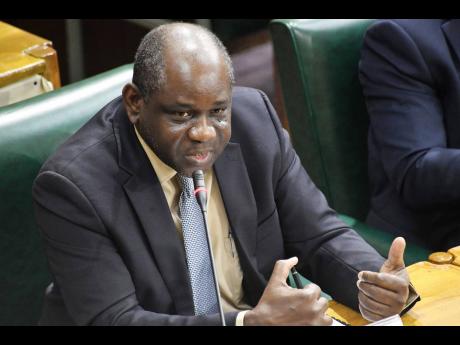Fiscal commissioner’s remuneration delayed
As House Speaker makes checks to verify payment terms
Fiscal Commissioner Courtney Williams yesterday confirmed to The Gleaner that since his appointment on May 1 last year, his compensation for the eight-month period May 1 2023 to December 2023 has been “delayed”.
Leader of Opposition Business in the Senate Peter Bunting revealed yesterday that Speaker of the House of Representatives Juliet Holness, who chairs the Commission of Parliament that recommends remuneration for the fiscal commissioner, had sought an opinion from Attorney General Derrick McKoy about when Williams should start getting pay.
An informed source told The Gleaner that the Speaker wanted to know whether Williams should be paid from the time he was appointed by the Governor General in May last year, or when he agreed to accept the remuneration package that was offered to him on December 6, 2023.
It has also been divulged that the Speaker wanted McKoy to provide an opinion on whether Williams should be paid for the eight-month period without evidence that the fiscal commissioner had been carrying out his duties since he was appointed on May 1 last year.
Williams told The Gleaner yesterday that since his appointment last year, he has been carrying out his duties as fiscal commissioner.
“I am a long-serving public servant. Notwithstanding the fact that this matter remains outstanding it has not stopped the work,” he said.
A reliable source said the attorney general advised that Williams should be paid his salary and emoluments from the day he was appointed fiscal commissioner.
Bunting, who raised the issue in the Senate yesterday, noted that Williams, a longstanding public servant who previously served as permanent secretary in the Ministry of National Security, had been offered compensation below that of his previous position.
Williams confirmed to The Gleaner yesterday that he had been in ongoing “conversation” with the parliamentary commission, chaired by Speaker Holness, to determine his compensation package.
Asked to comment on the lack of payment over the eight-month period, Williams said: “No one would be OK with not being paid for work done.”
Williams said that as a civil servant he has had to make adjustments in his spending over the period he has not been paid.
Bunting highlighted the issue while contributing to debate on the Financial Administration and Audit (Amendment) Act 2024.
The bill seeks to amend the Financial Administration and Audit Act to establish the National Natural Disaster Reserve Fund (NNDRF). The fiscal commissioner plays a role in terms of how funds from the NNDRF are disbursed.
The senior opposition lawmaker argued that the amended law would place increased responsibility on the fiscal commissioner whose “compensation is in limbo”.
“There were some attempts at negotiation and finally I guess we had the unusual situation where a fiscal commissioner was being himself put in an impecunious position, one where he would have become short of money having not received any salary from May 1 to December,” Bunting said.
Political points
Senate President Tom-Tavares Finson later confirmed that the Speaker wrote to the attorney general on January 22, 2024 and April 30, 2024, requesting an opinion on the remuneration of the fiscal commissioner. He said the attorney general provided a response with an opinion on June 6 this year.
“A meeting of the Commission of Parliament is scheduled for this Monday June 17 at 4 p.m.,” he told senators.
“Senator Bunting suggested that there was a reluctance on the part of the Speaker to share the opinion of the attorney general. That opinion was in fact circulated to all members of the commission including the leader of Government business in the Senate and the leader of Opposition in the Senate,” he said.
Tavares-Finson said the opinion was also shared with the leaders of Government and Opposition business in the Lower House, respectively, as well as the minister of finance.
Leader of Government Business Kamina Johnson Smith said she was disappointed that “information which was shared within the membership of a committee so confidentially, in the circumstances, that that information should have been used to try to presumably score some political points today”.
She argued that there was no question that should be placed in the minds of the public regarding the actions that were taken by the Speaker.
“I want to commend the (fiscal) commissioner who has been appointed and who has been working,” she said.
Johnson Smith, who piloted the Financial Administration and Audit (Amendment) Act 2024, said the bill provides that funds in the NNDRF can treat with disasters that severely affect the economy and that lead to economic loss of 1.5 per cent or more of GDP.
She pointed out that the NNDRF was not intended to replace or displace the role of the National Disaster Fund, which is established under the Disaster Risk Management Act to support mitigation and preparedness, as well as supporting rapid and early response to and recovery from disasters.
The provisions establishing the NNDRF are linked to Section 48 C 2 of the Financial Administration and Audit Act, which allows for the suspension of the fiscal rules under certain circumstances.
The NNDRF is to be financed by the Consolidated Fund. In the financial year 2023-2024 the sum of $200 million was allocated to the fund and in the current fiscal year $1.2 billion. In subsequent years some $400 million will be set aside for the fund.

